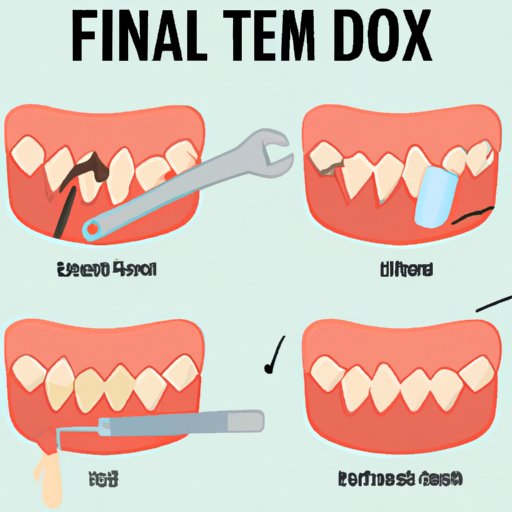
Introduction
A cavity is a hole in the tooth caused by tooth decay. It is important to fix a cavity as soon as possible to prevent further damage to the tooth and avoid more extensive and costly dental work. Early detection and treatment are crucial for maintaining good oral health and preventing serious dental problems.
Dental Fillings 101: A Step-by-Step Guide on Fixing Cavities
Dental fillings are a common treatment for cavities. They involve removing the decayed part of the tooth and filling the cavity with a material such as composite resin, metal, or porcelain. The process typically involves the following steps:
- Numbing the area around the tooth with a local anesthetic
- Removing the decayed part of the tooth with a drill
- Cleaning the cavity and preparing it for filling
- Placing the filling material into the cavity and shaping it to fit the tooth
- Curing the filling material with a special light
There are various types of dental fillings available, each with their own advantages and disadvantages. These include:
- Composite resin: a tooth-colored material that blends in with the tooth and is less noticeable than metal fillings
- Amalgam: a metal filling that is durable and long-lasting but more visible than composite resin
- Ceramic: a natural-looking filling that is resistant to staining and long-lasting but can be more expensive
Natural Remedies to Heal Cavities: Tips and Tricks
Natural remedies can help promote the healing of cavities and prevent further damage to the tooth. Some tips for using natural remedies for cavity treatment include:
- Limiting sugar and refined carbohydrates in the diet to prevent further decay
- Using fluoride toothpaste to help strengthen the teeth
- Oil pulling with coconut oil to help reduce bacteria in the mouth
- Applying clove oil or a garlic paste to the affected tooth to help alleviate pain and inflammation
It is important to note that natural remedies should not be used as a substitute for professional dental care, and should only be used as an adjunct to traditional dental treatments.
From Prevention to Cure: How to Fix Cavities Early On
Prevention and early detection are key to fixing cavities before they become more serious dental problems. Brushing and flossing regularly, eating a healthy diet, and visiting the dentist for regular check-ups and cleanings can help prevent cavities from forming in the first place. If a cavity does develop, early detection can help prevent the need for more extensive and costly dental work. Some signs of early-stage cavities include:
- Tooth sensitivity to hot or cold temperatures
- Pain when biting down or chewing
- A visible dark spot or hole on the tooth
Treatment options for early-stage cavities may include dental fillings or other minimally invasive procedures such as fluoride treatments or dental sealants.
Dental DIY: Fixing Cavities Without Visiting the Dentist
While it is always recommended to visit a dentist for the treatment of cavities, some at-home remedies may help alleviate pain and promote healing. Some best practices for DIY treatment include:
- Using clean hands or tools to apply any remedies
- Avoiding any remedies that may cause further damage to the tooth, such as using overly abrasive materials
- Limiting the use of at-home remedies and seeking professional dental care as soon as possible
Types of DIY remedies to try may include applying salt water or diluted apple cider vinegar to the affected tooth, or using a clove oil or garlic paste to alleviate pain and inflammation.
Tooth Decay Treatment: A Guide to Fixing Cavities for All Ages
There are various tooth decay treatment options available depending on the age and situation of the patient. Some treatment options for children may include:
- Fluoride treatments to help strengthen the developing teeth
- Dental sealants to help prevent cavities from forming
- Baby tooth root canal treatments to help preserve the baby teeth
Treatment options for young adults and seniors may include dental fillings, root canals, or tooth extraction.
The Dental Professional’s Guide to Fixing Cavities with Different Treatment Options
Dental professionals have various treatment options available to them depending on the severity and location of the cavity. Some factors to consider when choosing the right treatment option for a patient may include the size and location of the cavity, the age and dental history of the patient, and the patient’s personal preferences and budget. Best practices for patient education and follow-up care may include providing information on proper oral hygiene, scheduling follow-up appointments, and discussing the potential risks and benefits of each treatment option.
Conclusion
Fixing a cavity is important for maintaining good oral health and preventing more serious dental problems from developing. From dental fillings to natural remedies, there are various ways to treat and prevent cavities. By practicing good oral hygiene and seeking professional dental care as soon as possible, you can help prevent cavities from forming and keep your teeth healthy for years to come.





